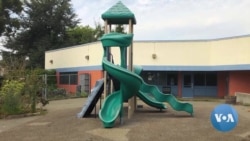Many schools are opening around the U.S. for in-person classes, but many others are offering classes online only.
That has set parents, school officials and community members scrambling to make sure every student has the equipment they need for online learning.
The pandemic has drawn attention to a long-standing problem in the U.S.: the gap between students who have the computers and internet access needed for online learning and those who do not.
Roughly 1 in 5 homes in the U.S. lack either a computer or an internet connection strong enough for online work, according to data from a Pew Research Center poll conducted in April.
A disproportionate share of those who lack online access are Black, Hispanic, live in rural areas or come from low-income households, according to research by a coalition of education and civil rights organizations.
“There is real urgency to try to solve that problem this fall,” said Robin Lake, director of the Center on Reinventing Public Education. “We're seeing a lot of school districts really committing to making sure that every kid has a device and finding hotspots and delivering them to families.”
A computer in every student’s home
On a sweltering August day in Oakland, California, a line of cars stretched down the block outside of Oakland Technical High School. Students were picking up textbooks for the semester, and some were also taking home laptops and hotspots, a device that provides access to the internet.
After a rocky spring semester where roughly half of Oakland’s students were insufficiently connected, Oakland city leaders launched a $13 million campaign to provide 25,000 laptops, hotspots, and ongoing technical support to families.
Thanks to large contributions from Twitter co-founder Jack Dorsey and others, the $13 million goal was met within days.
Saba Abdullah and her son who is beginning the 11th grade were in line to get a computer.
“We have one at home, it’s just really hard because we are splitting it between three of us,” Abdullah said.
Another mother, who last spring completed an online public health degree while overseeing the studies of her five children, has been visiting each child’s school to pick up equipment.
“Time management is very important,” the woman said, declining to give her name.
Phil Williams, whose children are Oakland Tech alumni, does tech support for Oakland schools. He said he is thrilled to be handing out equipment to help families gain online access at home.
“I think the internet connections to the world are almost as important as food in this day and age,” Williams said. “The pandemic forced us to rethink how we do things and get it right.”
A season of lost learning
When Oakland’s Emerson Elementary School closed its classrooms in March, second grade teacher Peter Limata worried about losing contact with his students, the majority of whom come from low-income families.
Just days into the shelter-in-place order, he launched “Storytime With Mr. Limata” on Facebook Live, reading a new children’s book each day. He chose Facebook because he guessed more families would be able to access it using cellphones.
“Storytime With Mr. Limata” did help him connect with some students, as well as earning him fans around the world.
As the new school year begins, Limata fears that some students who have not attended daily Zoom class sessions are still lacking what they need to connect.
“It’s the difference between you having school and you not,” he said. “Or the quality of school that you have because sometimes students might not participate in a conversation because every time they turn on their video, or just even to try and speak, it glitches because it's (internet signal) not strong enough.”
Lost instruction time this year has been widespread, and education researchers like Robin Lake, who detailed her findings in a recent report, are assessing what the long-term effects might be.
“That kind of learning loss may amount to up to six months, in some cases, a year's worth, of lost math content because the teachers weren't able to do that reinforcing and really driving home the concepts for kids,” said Lake, the director of the Center on Reinventing Public Education.
It’s a situation many school districts are hoping to make better, by filling a long-standing technology gap and equipping the citizens of the future.





